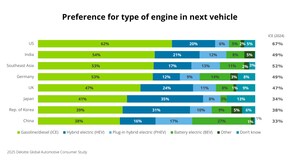Higher confidence levels linked to controllerships with in-function ESG leads and organization-wide influence
NEW YORK, April 24, 2023 /PRNewswire/ -- Less than half of professionals (45.7%) say they are confident in the ability of their organizations' financial reporting teams to gather and report on environmental, social and governance (ESG) financial metrics for regulatory compliance purposes, according to a recent Deloitte poll.
"It's concerning to see so few respondents reporting confidence in their ESG reporting as we await new U.S. regulatory guidance on climate disclosure reporting requirements," said Dina Trainor, a Deloitte Risk & Financial Advisory managing director specializing in helping organizations implement new accounting and regulatory reporting regulations, Deloitte & Touche LLP. "Now is the time to take a close look at your organization's current ESG reporting capabilities and protocols and undertake improvements if needed. The good news is that there are clear actions organizations can pursue that have a strong correlation to building trust in ESG reporting."
Few professionals (16.4%) report that their organization has an ESG controller, an individual focused on the financial reporting and controls aspects of ESG. Yet, professionals from organizations that have an ESG controller report confidence in their ESG financial reporting that is 30 points higher (75.5%) than the confidence levels of those without an ESG controller (45.3%).
At the time of the poll, 41.6% of respondents said their organizations have no plans to hire dedicated ESG controllership staff, while 7.2% plan to hire an ESG controller in the year ahead.
"Naming a leader, such as an ESG controller, to spearhead ESG finance and accounting efforts is one of several ways to raise confidence and trust levels in related reporting, no matter organizational scale," said Matt Hurley, a Deloitte Risk & Financial Advisory partner, Deloitte & Touche LLP. "Organizations of any size, geographic footprint and complexity can take advantage of such roles — whether temporary or more permanent — to establish, hone and maintain ESG reporting programs. Ensuring finance or accounting leaders are involved in ESG matters is similarly important."
Just as staffing for an ESG controller role seems to correlate to respondents' confidence in ESG financial reporting, accounting and financial professionals' ability to influence ESG matters also seems to benefit reporting confidence. More than half of respondents (53.4%) say their finance functions have some level of influence on organizational ESG matters, ranging from attending board meetings to producing ESG management reports to offering occasional opinions on ESG. And, those professionals with finance teams able to influence ESG matters boast confidence levels more than double (60.7%) those who say their finance team has no organizational influence (27.2%).
"It's important that finance teams have a seat at the table when it comes to ESG, as financial reporting and analysis, as well as the data that contribute to them are often set by the tone at the top," said Trainor. "If finance is not teaming effectively with those who are leading ESG for their organizations — and vice versa — reporting accuracy and efficacy could be at risk."
Data collection to support ESG efforts is the biggest challenge as reported by more than a quarter of respondents (26.3%). Interestingly, professionals from organizations with an ESG controller are more likely to report data collection as their organization's top challenge (39.6%).
Added Hurley, "The basics of ESG reporting are universally challenging. Surprisingly, those that have ESG controllers in place report data collection challenges at a higher rate, possibly because that individual is more in tune with the unique challenges that ESG data aggregation and controls can pose. It's important that organizations focus on building the foundation — including sourcing, cleaning, and assuring data — to support successful, confident reporting on the back end."
Over 3,000 professionals were polled during a recent Deloitte Center for Controllership webcast, titled "Operationalizing ESG reporting readiness through the Controllership playbook," on Feb. 23, 2023. Answer rates differed by question.
Deloitte provides industry-leading audit, consulting, tax and advisory services to many of the world's most admired brands, including nearly 90% of the Fortune 500® and more than 7,000 private companies. Our people come together for the greater good and work across the industry sectors that drive and shape today's marketplace — delivering measurable and lasting results that help reinforce public trust in our capital markets, inspire clients to see challenges as opportunities to transform and thrive, and help lead the way toward a stronger economy and a healthier society. Deloitte is proud to be part of the largest global professional services network serving our clients in the markets that are most important to them. Building on more than 175 years of service, our network of member firms spans more than 150 countries and territories. Learn how Deloitte's approximately 415,000 people worldwide connect for impact at www.deloitte.com.
Deloitte refers to one or more of Deloitte Touche Tohmatsu Limited, a UK private company limited by guarantee ("DTTL"), its network of member firms, and their related entities. DTTL and each of its member firms are legally separate and independent entities. DTTL (also referred to as "Deloitte Global") does not provide services to clients. In the United States, Deloitte refers to one or more of the US member firms of DTTL, their related entities that operate using the "Deloitte" name in the United States and their respective affiliates. Certain services may not be available to attest clients under the rules and regulations of public accounting. Please see www.deloitte.com/about to learn more about our global network of member firms.
SOURCE Deloitte

WANT YOUR COMPANY'S NEWS FEATURED ON PRNEWSWIRE.COM?
Newsrooms &
Influencers
Digital Media
Outlets
Journalists
Opted In





Share this article